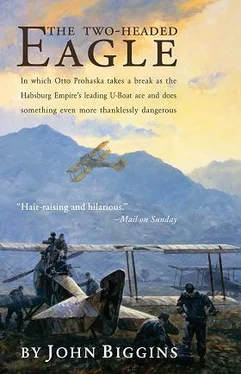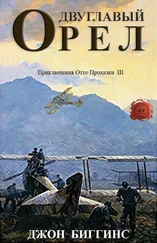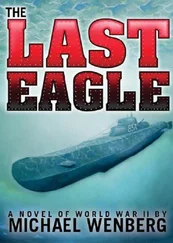Anyway, the outcome was that when a specialist long-range bombing squadron was created—after long delays for the appropriate paperwork to be completed, naturally—it was split off from an existing unit, Flik 19, and disguised as a long-range reconnaissance unit. It was a rather neat piece of duplicity. But in the end it created as many problems as it solved, both administrative and personal. The parent unit, Flik 19, formed in the spring of 1916, had already built up a reputation as one of the best and most enterprising Austro-Hungarian flying units; largely because of its remarkable commanding officer Hauptmann Adolf Heyrowsky, the man who had not been able to meet me when I arrived at Haidenschaft and who it seemed was conducting a running campaign of insults against my own commanding officer Hauptmann Kraliczek.
Heyrowsky was the very model of the Old Austrian career officer, one of the few survivors of a species which had been largely destroyed in the autumn of 1914 at Limanowa and Krasnik. A superb fencer, skier and marksman, Heyrowsky—though not especially bright—was a man of exemplary courage, unshakeable loyalty to the House of Habsburg and spotless personal integrity. Although completely without experience in the air, he had insisted on flying as an observer from his first day with Flik 19, and within a month had bagged two Italian aircraft with a Mannlicher hunting rifle. And as if this were not enough, during the Fifth Isonzo battle in May, when the weather had been too bad for flying, he had volunteered to fight evenings and weekends (so to speak) as an infantry officer in the trenches.
Such a man as this was no more likely than his imperial master to take kindly to the idea of running an air unit designed to drop bombs on cities far behind the lines. Quite apart from the risks to civilians, he held it to be the duty of fighting airmen to fight in the closest possible support of the men in the trenches. But there was also the administrative insult offered to him by the existence of Flik 19F. Flik 19, you see, remained under the command of its nearest corps headquarters—the Archduke Joseph’s 7th Corps at Oppachiasella if I remember rightly—while we, being a strategic flying unit, came directly under 5th Army Headquarters far away in Marburg. Now, there is nothing that a professional officer loathes more than to have responsibility for a unit but no operational control over it—rather like being responsible for one’s wife’s debts when she has been living with another man for years past. So quite apart from the personalities involved, Hauptmann Heyrowsky could scarcely have been expected to look with any favour on this bastard offspring of his.
But the fact is that quite apart from his professional dislike of Flik 19F, Heyrowsky nursed an almost homicidal enmity towards the wretched Kraliczek, whom he despised as a desk-soldier of the most abject kind. It was not poor Kraliczek’s fault, I suppose, that his name was a Germanised version of the Czech word for “little rabbit” (a fact of which Heyrowsky was well aware, since he spoke that language fluently along with six or seven others). But it was a pity that the man’s timid, grey, burrowing, nocturnal nature should have corresponded so exactly with his name. The very sight of such a creature might well be expected to arouse in a warrior like Heyrowsky feelings—well, feelings like those of a weasel confronted with a rabbit. I was told in fact (confidentially, since it had had to be kept quiet at the time for fear of a court martial) that, a few weeks before, there had been a disgraceful scene when Kraliczek had arrived at Fliegerfeld Haidenschaft to visit Heyrowsky on some business or other and had emerged from the Kanzlei hut after a few minutes pursued by Heyrowsky, with his sporting rifle, firing shots around Kraliczek’s boots as the latter scurried towards his staff car and shouting, “Run for your life, bunny rabbit!” Since then scarcely a day had gone by without some elaborate insult—like the offer of bicycle-riding lessons—being conveyed from Haidenschaft to Caprovizza: all with perfect impunity, since Heyrowsky knew that any complaint by Kraliczek would involve the latter in a court of honour and the choice either of fighting a duel or of being cashiered in disgrace.
Quite apart from its shortcomings as regards supply of aircraft and organisation, the k.u.k. Fliegertruppe when I was seconded to it in July
1916 still suffered from yet another crippling disadvantage imposed on it by the intense conservatism of its superiors. This was the doctrine, still held to by the War Ministry even if it was beginning to break down in the field, that it was the job of an officer to command an aeroplane and the job of an enlisted man—a sergeant at best—to fly the thing. The trouble was, I think, that even if k.u.k. military officialdom had by now grudgingly accepted that it needed an air force of some sort, it was damned if it was going to let the exigencies of flying get in the way of the famous Old Austrian discipline which, over the previous two centuries, had caused the Habsburg Army to be kicked about the deck by a succession of enemies ranging in size from France to Montenegro. In particular it would countenance no dilution whatever of that sacred entity the Habsburg officer corps, twin pillar of the Dynasty along with the Catholic Church.
By 1916 this was frankly a crazy notion: ever since the 1870s the old Imperial aristocracy had been withdrawing from military life and its place had been taken by ordinary people like myself, grandson of a Bohemian peasant. Even before 1914 the k.u.k. officer corps had been a thoroughly bourgeois body, and the terrible losses of that year had made it even more so by bringing in huge numbers of hastily commissioned cadets and one- year volunteers: youths who would have been pharmacists and schoolteachers but for the war, and who would certainly go back to dispensing pills and teaching French grammar once it was over. Yet still the War Ministry behaved as if we were all Schwarzenbergs and Khevenhullers, and as if tying on the sacred black-and-yellow silk sword-belt (which large numbers of newly commissioned officers were now not even bothering to buy) was the next best thing to being anointed with consecrated oil by the Pope. Meanwhile men from the ranks—without the all-important Matura certificate which allowed them to apply for a commission—were debarred absolutely from becoming officers, no matter how able and energetic they might be. So far as I know, no ranker-pilot in the k.u.k. Fliegertruppe was ever made an officer, though I believe that as a special mark of esteem the Hungarian ace Josef Kiss was promoted to officer-aspirant in 1918, once he was dead and safely out of the way.
The results of this imbecility were plain enough to see as the war went on. Our fliers invariably fought bravely, but the level of initiative and enterprise, it has to be said, was generally not high: not when compared with the German Flying Corps—which had once been as caste-conscious as our own but had changed its ideas under the pressure of events—and certainly not with the British on the Piave Front in 1918, when our Air Force had rings run around it by a handful of RFC squadrons whose pilots were almost all second lieutenants and whose daring was quite legendary. Certainly the mind-numbing routine of the old pre-war k.u.k. Armee—lots of drill and parades, because they cost less to put on than proper exercises, impressed the populace and required very little mental effort—was no very good preparation for a type of fighting that required the utmost qualities of self-reliance and initiative.
So it was that in the afternoon of my second day with Flik 19F, after returning from Oberleutnant Rieger’s funeral, I made the acquaintance of the man who was to be my own personal coachman in whatever desperate adventures lay ahead. The Operations Warrant Officer had informed me that I was to make my first operational flight the next morning, to photograph ammunition dumps near the town of Palmanova at the urgent behest of 5th Army Headquarters. So I naturally felt it to be important to prepare for this quite lengthy flight over enemy territory by at least being introduced to the man who was to fly me there and (all being well) back again.
Читать дальше












